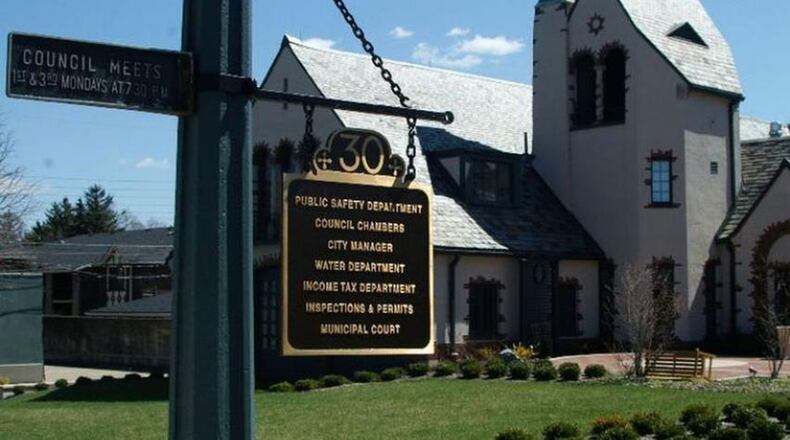The report, which used 2016 traffic data, recommends the city conduct a fuller analysis and “begin appropriate training to ensure that all people driving in Oakwood are treated fairly and without discrimination.”
MORE: Report: Oakwood police stop black drivers at a higher percentage
Mayor Bill Duncan Duncan said Law Director Rob Jacques and Director of Public Safety Alan Hill have met with the report’s authors, Ellis Jacobs, senior attorney with ABLE, and University of Dayton criminal justice professor Martha Hurley, to discuss findings.
The mayor said he takes the challenge of addressing the issue personally as he studied how the city handled the issue in 2001 following a Dayton Daily News article about Oakwood’s traffic stops and felt the response was transparent and thorough.
“We take all matters seriously related to the delivery of our public safety services and have already completed an initial review of the report,” Duncan said. “Through this review, we identified several areas that merit further discussion.”
He said Oakwood has an anti-bias policy training police for the safety department that has been in place since 2012 that has been updated each year including dealing with issues like implicit bias, racial profiling and cultural diversity.
MORE: Oakwood earns lone local ‘A,’ Dayton rises to ‘D’ on state report card
The ABLE report found in Oakwood in 2016 black drivers accounted for 21.9 percent of the traffic stops where a problem with driving or equipment was observed, and 36.8 percent of the stops where a license plate check was run without tickets being written for an observable driving or equipment problem.
The analysis said that in Oakwood 26 percent of all people ticketed were black, and blacks received 33 percent of all tickets. (Some drivers received more than one ticket). In Kettering, 20.1 percent of the drivers receiving traffic tickets in 2016 were black and they received 23 percent of all tickets issued that year.
There are two primary ways a traffic stop is initiated in Oakwood: police give traffic tickets when they see drivers committing traffic offenses or when they see vehicles with obvious equipment problems, according to the report.
Officers also have the discretion to run computer database checks on the license plates of cars as they drive by to check for license suspensions and other infractions reflected in those databases.
MORE: What’s on your ballot?: Voters guide available for November election
Duncan explained that the city has not and will not allow unfair treatment of any individual for any reason, but if issues or concerns arise, they will be dealt with expeditiously. He also said he didn’t see in the reports any “explicit or implicit bias” against any race or ethnicity.
“Nonetheless, city council has an obligation along with city staff to analyze the findings of this report,” he said. “I commit to being as transparent as we were 18 years ago in addressing this report.”
He said the city will work with ABLE and Hurley to address concerns.
“While we are already conducting regular training on implicit bias and related topics, we are open to considering additional training as may be warranted,” Duncan said. “We are also open to discussions about the use of random license plate checks to determine how our policies and procedures compare to law enforcement’s best practices.”
Duncan said the city will give a status report to the community in approximately 60 days.
ELECTION 2016: Who's running for Dayton City Commission? Watch debate video
Dayton Unit NAACP President Derrick Foward told council that Oakwood is a “beautiful city,” but that racial profiling is real and should be dealt with through training officers and getting rid of running the license plates of black drivers who are not breaking the law.
“I can tell you that racial profiling is real,” Foward told council, adding that the issue is felt in communities across the country. “I’m glad to hear that council will consider looking at enhanced training for officers.”
Resident Sam Dorf told council the report wasn’t a surprise.
He called the traffic stop issues “the tip of the iceberg,” adding that city officials need to “dig deeper into the data,” in order to come up with a solution to what he called racial profiling.
“I have friends that refuse to come to my house in Oakwood because they are African American and they are afraid to drive down the streets of our city,” Dorf said.
Residents Myrna Gabbe and Matthew Curry also addressed their concerns regarding the ABLE report.
MORE: Oakwood ends deal with school treasurer
“I hope that we can do something to fix this problem,” Gabbe said. “This strikes me as we have a bigger problem that we would like to admit to.”
Curry said “driving while black” is an issue and, if in fact it is going on in Oakwood, then it needs to stop.
“I support the efforts of our public officials to keep us safe,” he said. “But we should not be stopping individuals unless there’s cause.”
Dayton resident Ed Wilson told this news organization on Tuesday that he has been following the story and feels that Oakwood law enforcement is doing a good job and deserves support.
“Safety is important, and if you have an issue with a ticket, go to court like everybody else,” he said. “We all roll stop signs or speed, and when we get caught, we pay a fine.”
MORE: Oakwood reaches 3-year deals with public safety employees
About the Author
